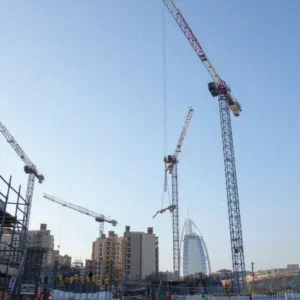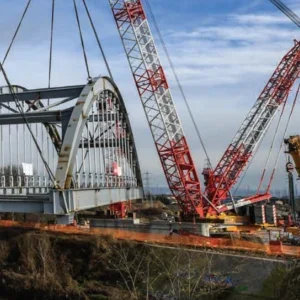I have been involved in the crane industry for over 40 years. The business started from when I was working for Gottwald in Düsseldorf, Germany, and was an engineer for them. It really grew off the back of that, and we are now involved in many major projects, and not just with cranes.
We are effectively agents for many companies within the crane industry, including Diepa crane ropes from Germany. We are also agents for Four Point Lifting Systems in the US and their jacking systems, and Luna Cranes from Spain.
We have just recently been appointed the main agent for new company Beaver Crane from Holland who manufacture small telescopic crawler-type cranes. We’ve been negotiating with them for some time because they have good design and engineering, which I liked. It is a new area for us in so much that we are historically known in the heavy crane market, however it is an area of marketing that we have been toying with to break into and the Beaver Crane concept is unique in many ways and has a great future.
We are looking to develop this side of our business in the UK and Ireland, South and North America, Africa, the Middle East and India. Business has been extremely good for the last 18 months, and we’ve not really been affected by the downturn. This is because we are an international company with a worldwide customer base developed over many years, and because we have an excellent reputation.
We’re still making sales, and we’ve just opened a new workshop in Chester, which will mainly be handling refurbishments, rebuilds and upgrade work for crane hire and insurance companies. We are currently upgrading a 1,200t crane to bring it up-to-date with the latest technologies. It is a major project, and we have a few others to do as well.
We are also heavily involved doing work for insurance firms and loss adjusters, acting as an ‘expert’ in relation to crane incidents, as well as with Technical Demolition Service on the demolition of cranes, mainly ship-toshore- type gantry cranes. We are currently involved in demolishing six large gantry cranes at a port in Spain following a severe storm. There is lots of work in that area and we are mostly acting as consultants.
We’ve also manufactured our own special cranes for the nuclear industry, including a 600t Claxton crane for decommissioning work at a BNFL site. The project, from winning the contract to the crane carrying out the work, took nine years, and BNFL said it was one of the most successful cranes it has worked with on decommissioning. We are now working on other projects and upgrades in the nuclear industry.
Off the back of that success we are now marketing a range of colour CCTV nuclear cameras manufactured by Ahlberg of Sweden with high radiation tolerances that can go into areas where previously only monochrome tube cameras were available.
We are crane people effectively, but we are now diversifying our business. In December last year we were awarded a major project to upgrade the flood defence barrier for the city of Belfast, using our expertise with electrics and hydraulics. This diversification is about turning our knowledge into another area of expertise.
It has been good for us, and we’ll keep pushing in all directions to grow our business. We’re also focused on developing our regular business. For instance, we have regular major crane rope orders in Azerbaijan for the offshore industry and we’re looking to develop and push the Diepa range of ropes extensively both here in the UK and overseas. Regular repeat orders maintain cash flow and, as we know, cash flow is important for any business. Business tends to flow with peaks and troughs but we’ve tried to level this off.
The beauty of our business now is that we don’t know what the next phone call is going to be, but we’re not losing sight of our core business, which is cranes. We will never lose sight of our heritage.
Sudan’s Darka for Trading and Services Co Ltd has delivered an 82t mobile crane from the Port of Sudan to Eritrea, using bulldozers and loaders, to level the uneven roads, and even an armed escort.
The 800km, five-day journey included a final 130km leg across rough roads, where the bulldozers and loaders were used to fix and settle the uneven surface.
Darka said the delivery of the crane was the first of its kind to be done through the Port of Sudan and then transported across the Sudan-Eritrea border. The Ebrolift crane was delivered to the Bisha goldmine project in Eritrea.






